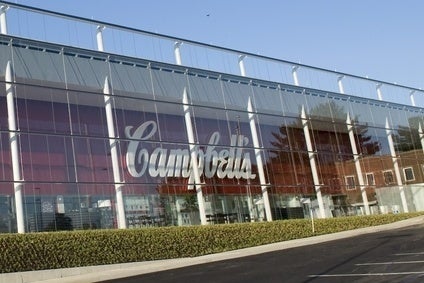Campbell Soup Co. has looked to inject growth into its business through acquisitions in recent years and the indications are this is likely to continue. But where should the US giant look to do deals? Stefan Kirk, just-food M&A columnist and advisor at M&A consultants Glenboden, weighs up the group's options.
Campbell Soup Co. is one of a handful of US ambient foods groups that often come up as acquisition targets. With its recent decline in sales, the speculation will only continue.
However, on balance, Campbell may survive this cycle's M&A activity, and indeed should seek to acquire more companies in growing categories, or to increase scale and extract synergies.
Growth more potential than actual
Campbell talks about plans to expand into higher-growth categories and geographies and has made some moves along this path. The reality, however, is the group's top line has been stagnant in recent years (see profile).
In fact, the group's management seems resigned to this stagnation continuing, having recently reduced its sales outlook down to 1-3% per year, from its previous target of 3-4%.
To make things worse, Campbell's sales revenue declined by as much as 4% in the third quarter of its 2015 financial year, and by 6% in its most core business, US simple meals, including a 10% drop in sales of its iconic branded soups.

US Tariffs are shifting - will you react or anticipate?
Don’t let policy changes catch you off guard. Stay proactive with real-time data and expert analysis.
By GlobalDataCampbell is protected by high margins
In this context, Campbell could appear as an acquisition candidate. However, the group delivers an EBITDA margin of over 18% (see profile). It also has a target of annualised cost savings of US$250m, which would push that margin above 20%.
With that level of profitability, it would be hard for a 3G Capital or a Nomad Foods to convince Campbell's shareholders the group is under-performing. They would also need to offer a very high price, given Campbell's current stock trading valuation of nearly x12 EBITDA (see valuation).
On top of that, the most likely buyers are arguably not ready to take on Campbell. 3G is still digesting its merger of HJ Heinz with Kraft Foods Group, as well as trying to justify a very high valuation of the latter.
Nomad is focused on frozen foods after its acquisition of Iglo Group, with the possibility of Findus Group assets in Europe joining the business. Other candidates are either too small or too indebted.
Is Campbell happy just to coast along?
With its high profitability and cost-cutting plans, as well as treasury stock purchases, consistent dividend payments and increased earnings per share guidance, it's easy to conclude Campbell's management is keeping its shareholders happy.
 |
On the other hand, an activist shareholder could complain the group's management is too conservative, and missing out on opportunities to grow the business through acquisitions. Campbell's indebtedness is quite low now (see profile); it could raise nearly $3bn in additional debt capital, for acquisition purposes, and still keep its net debt ratio below x4 EBITDA (before any merger the company could look to do).
After three deals in a year between the summers of 2012 and 2013 (Bolthouse Farms, Plum Organics and Kelsen), Campbell has been relatively quiet on the M&A front. It sold its European simple meals business in 2013 for $548m and, since the Kelsen acquisition, it has only moved to acquire salsa maker Garden Fresh Gourmet, a $231m deal it announced in June.
Fresh products unattractive
The obvious area for acquisitions is fresh products, especially now Campbell's has split out a new packaged fresh division, for reporting purposes, that includes chilled carrots, super-premium beverages, salad dressings and refrigerated soup, with a core asset being Bolthouse, which it acquired for $1.55bn in 2012.
However, those are not categories with exciting prospects in terms of scale or profitability. In fact, fresh products are generally lower margin than ambient foods are. Just look at the EBITDA margin delivered by Chiquita Brands International or Fresh Del Monte Produce, then compare it to that of Campbell.
The group would be better served by making acquisitions that increase its scale in its existing core businesses, namely centre-of-store simple meals, baking and snacking and beverages. Alternatively, it could look for acquisitions in sustainable foods such as organic.
What are the candidates in its core businesses?
There are a number of branded ambient grocery players in the US smaller than Campbell but would give it significantly greater scale and allow it to extract synergies in manufacturing, supply chain or sales and marketing.
Let's start with Pinnacle Foods, which has been majority owned by private equity firm Blackstone since 2007, and is for sale if a potential buyer appears. That would add $2.5bn in sales to Campbell, expand its grocery offering and take it into frozen foods. Pinnacle owns the Birds Eye brand in the US, as well as the recently-acquired (but much smaller) asset of meat-free brand Gardein.
Other candidates might include Flowers Foods, which would add nearly $4bn in sales and greatly expand Campbell's bakery products offering. If that's too expensive for the group, then a smaller alternative could be B&G Foods, which would provide Campbell's with a stable of new brands.
Sustainable foods more exciting
Another option, which would be more of a growth platform story than the candidates above, would be in sustainable categories like organic or other segments, that are seen to be better for people or for the planet.
In that space, Hain Celestial would add more than $2bn in sales revenue, and a strong growth trajectory, in grocery products, snacks, tea and personal care products. Hain Celestial grew its top line by nearly 25% in its 2013/2014 financial year alone.
Such an acquisition would transform Campbell's from being a sleepy, stagnant grocery foods company, to being an exciting, high growth business including natural, organic and better-for-you categories.





